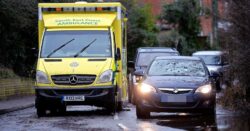It comes the day before planned strike action in the ambulance service in England and Wales (Stock picture: Getty)
The South East Coast ambulance service has declared a critical incident due to pressure on services.
They said they took the decision yesterday evening ‘following a period of more than a week of sustained pressure across both our 999 and 111 services which has significantly impacted on our ability to respond to patients’.
They said: ‘We would like to thank all our staff and volunteers for their hard work and commitment in recent days in what continue to be extremely challenging circumstances.
‘We urge the public to continue to call 999 in life-threatening emergencies as we prioritise our response to our most seriously ill and injured patients.
‘People can continue to support us by seeking help and advice from alternatives including via NHS 111 Online at 111.nhs.uk, their own GP or by speaking to a pharmacist.
‘Declaring a Critical Incident provides us with additional oversight and enables us to explore options including mutual aid, while focusing all efforts on frontline patient care.
Military personnel preparing to provide cover for ambulance workers on December 21 and 28 when there will be strikes over pay (Picture: PA)
‘The situation will be kept under close review.’
A period of freezing weather, coupled with rising flu admissions, ongoing Covid-19 pressures, and record staff absences, is already putting pressure on the NHS.
It comes the day before the first day of planned strikes by ambulance workers, including at South East Coast, when the public have been warned to avoid ‘risky activities’.
The NHS was already expected to be hit by major disruption as paramedics, control room workers and technicians walk out in England and Wales.
Workers voted to strike over the Government’s imposed 4% pay award – described by GMB union as ‘another massive real terms pay cut’.
During the strike, the military will not drive ambulances on blue lights for the most serious calls but are expected to provide support on other calls.
To view this video please enable JavaScript, and consider upgrading to a web
browser that
supports HTML5
video
Health minister Will Quince urged the public to avoid anything risky tomorrow, telling BBC Breakfast: ;Where people are planning any risky activity, I would strongly encourage them not to do so because there will be disruption on the day.’
Downing Street later declined to set out what ‘risky’ activities might include, with the prime minister’s official spokesman telling reporters: ‘The public, as we saw through Covid, can be trusted to use their common sense.’
Negotiations between unions and ambulance services are ongoing to work out which incidents should be exempt from strike action.
It is expected that all category 1 calls, the most life-threatening such as cardiac arrest, will be responded to.
Some ambulance trusts have agreed exemptions with unions for specific incidents within so-called category 2 which covers serious conditions, such as stroke or chest pain.
Get in touch with our news team by emailing us at [email protected].
For more stories like this, check our news page.
The South East Coast ambulance service has declared a critical incident due to pressure on 999 and 111 services.




